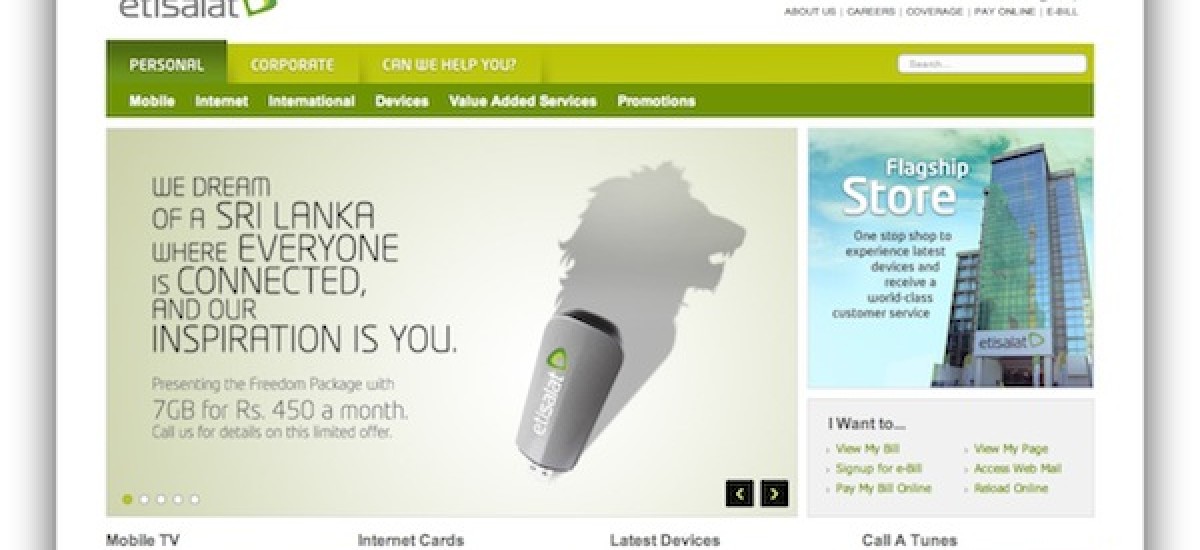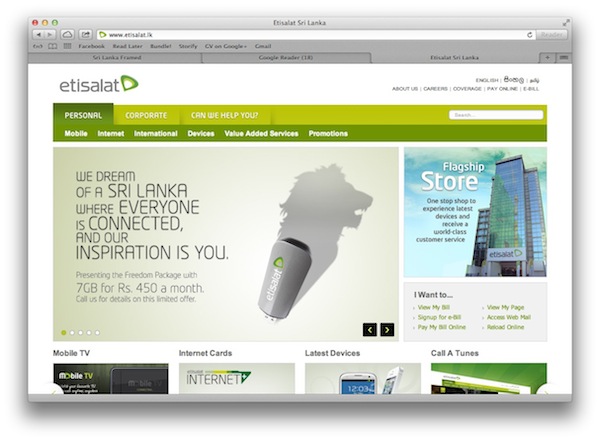When Etisalat dreams of a Sri Lanka where everyone is connected, it’s clearly thinking only of the Sinhalese. Why else would the company’s website feature, so prominently, a Lion to depict ‘everyone’ in Sri Lanka?
In popular media, corporate marketing and government output, there are numerous other examples of a racism so deeply internalised and ingrained in Sri Lanka that even when flagged, it is dismissed as unimportant or at best, of marginal and passing interest.
As we tweeted,
@30streetstudio @etisalatsl It’s this that’s most worrying about #srilanka – ingrained racism, so normalised it is, to most, invisible. #lka
— Groundviews (@groundviews) February 13, 2013
Another particularly revealing example from Government recently came in the form of the Police spokesperson’s comments over an ill-thought out and executed census of vehicular traffic coming into Colombo. As reported in Ceylon Today, the forms handed out to motorists in light vehicles were only in Sinhala, raising the ire of the Government’s own Minister of National Languages and Social Integration, Vasudeva Nanayakkara.
Speaking to Ceylon Today, Nanayakkara said handing over forms only in the Sinhala language is a violation of the National Language Policy. He added, the police are bound to follow the National Language Policy and accordingly the forms should have been trilingual.
The Minister also diplomatically noted that the forms could not have been done at the instruction of the Inspector General of Police. This ostensible support of the National Language Policy notwithstanding, the Police spokesman’s comments tell another story.
Police Media Spokesperson, SSP Prashantha Jayakody said the police were unable to give the forms in all three languages as the decision to conduct the survey was a sudden one. He said, no driver was forced to fill the forms, and as the forms were easy to understand, it was not a serious issue.
When Ceylon Today questioned whether the police are planning on giving out the forms in Tamil and English languages as well, he said, at the moment they have no such plan to do so.
Emphasis ours.
So not only do the Police not see any need to comply with the Government’s own language policies, they think non-compliance isn’t really a big problem. The animating mentality, much like Etisalat’s graphic, is quite simply racist.
The litmus test is a very simple one – role reversal. The Police spokesman in particular and all the Sinhalese who think that the marginalisation of Tamil, and by extension, the Tamil people, is “not a serious issue”, should try to fill out the following form, given that it’s so “easy to understand”.
This is a translation into Tamil of the original form in Sinhala handed to motorists by the Police, which is accessible on the web. If the majority of readers and the Police spokesman himself cannot fill this out, then why flippantly suggest that Tamils find it any easier to fill it out in Sinhalese?
Ingrained racism in Sri Lanka runs deep, and is reflected even in the assumption that those calling a leading hospital’s hotline are Sinhalese.
@mhmhisham Is there language differentiation in helpline #’s? Else, odd to prioritise Ayubowewa, when country also says Vanakkam?
— Groundviews (@groundviews) February 11, 2013
The interim recommendations of the LLRC, released as far back as November 2010, clearly noted that “many people who gave evidence before the Commission expressed grave concern that they were expected to communicate with public officials or perfect documents in a language they did not understand”.
In the LLRC’s Final Report, released a year after, it noted with regret that “recommendations on urgent measures made by the Commission in its interim communication to the President on these matters have yet to be implemented” (Section 8.229). Page 308 – 310 of the LLRC’s Final Report have a number of extremely insightful observations, including from members of the Buddhist clergy, about how the marginalisation of the Tamil language, and by extension, the marginalisation of the Tamil community, is a very serious impediment to reconciliation post-war.
And yet why is there no greater condemnation over the Police spokesman’s outrageous sentiments, or the inability of public institutions to greet people in a language that reflects what they would choose to communicate in? Why don’t we identify and condemn marketing that conflates Sinhalese as a group with Sri Lanka as a place? Perhaps the majority, comfortable in the knowledge that their language is after all, what really matters in Sri Lanka, remain oblivious to how demeaning and violent it is to be told that non-representation and non-use of a language is “not a serious issue”.
There is some hope. As @prabudeepan notes,
@groundviews I know friends who refused to accept it since it wasnt in Tamil. Even though they were Sinhalese.
— Prabu Deepan (@prabudeepan) February 14, 2013
We wonder though whether in a country where racism is so ingrained it is invisible to the majority, small gestures of outrage are enough to avert another drift into open communal violence.


